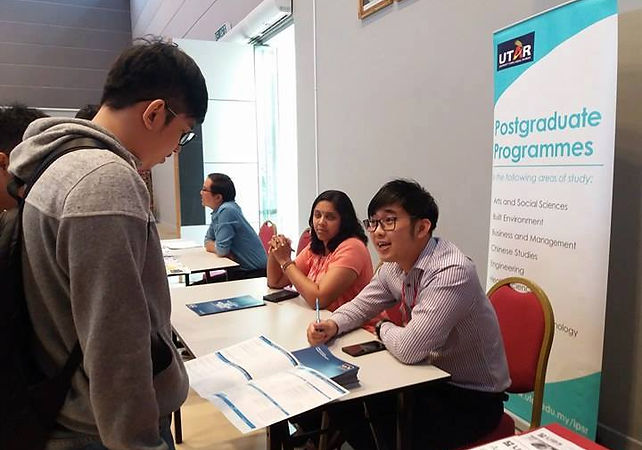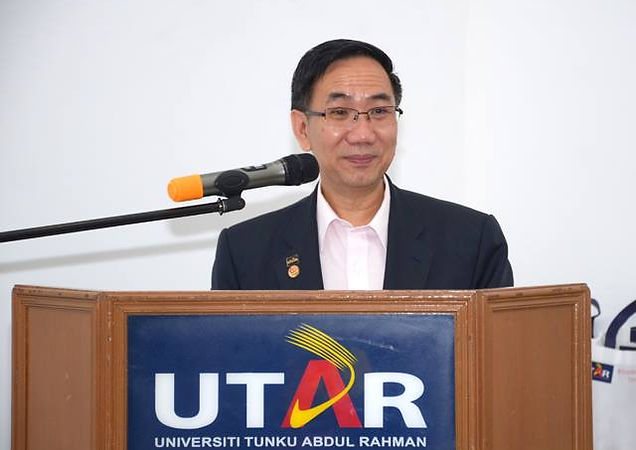Highlights
A Tea Meeting with UTAR President
By Jacinta Leong Mei Ting


Prof. Chuah was giving advice to the graduating students concerning their future career paths.
An interested student was enquiring about the job prospects at the information booth during exclusive career consultation session.
February 21, 2017
KAMPAR: Graduands of August 2017 Convocation were invited for a tea meeting with the President of Universiti Tunku Abdul Rahman (UTAR), Ir. Prof. Academician Dato’ Dr Chuah Hean Teik.
The meeting was organised by the Department of Alumni Relations and Placement (DARP) at UTAR’s Heritage Hall, Kampar Campus.
Also present were Dr. Gideon Khoo, Deputy Dean from Faculty of Science, Dr. Tan Kok Tat, Deputy Dean from Faculty of Engineering and Green Technology, Dr. Alia Azalea, Dean from Faculty of Arts, and Social Science, Dr. Cheng Wai Khuen, Deputy Dean from Faculty of Information and Communication Technology, Dr. Au Yong Hui Nee, Dean from Faculty of Business and Finance, Dr. Ling Lion Ngo, Deputy Dean from Institute of Chinese Studies, as well as Mr. Foo Wai Wai, Head of Department of Alumni Relations and Placement.
Prof. Chuah remarked that this convocation is a ceremony celebrating the students’ success and achievements with their families and friends.
“On this note, I would like to urge all of you to be courteous towards your parents as convocation is not merely a celebration of your success, but also for your families as well,” he then advised students to treat their family members with patience during the convocation in showing and navigating them around the campus.
Besides, he also gave some words of advice regarding future decisions on students’ career paths.
“You need to think carefully in making decisions for your own survival. Most of these decisions, even including decisions to study in UTAR were made by your parents. But from now onwards, you must learn how to make judgements, whether to further your post-graduate studies, or stepping into industry after graduation,” he said.
Due to today’s fast-growing environment, Prof Chuah encouraged the graduating students to develop their creative capacity as to better adapt to the increasingly competitive working world.
“Let me share an aspiring story about how rural e-commerce changes the lives in rural China. Taobao and Chuntao, for example, are amongst the most successful e-commerce in China that operated in Hangzhou, Zhejiang by Alibaba Group.
There was a poor villager who started using Chuntao and eventually managed to earn great profit after selling his hand-made Lantern. Clear to see that the advent of Chuntao not only helps to revitalise Chinese rural villagers, but also open door for them to develop their online businesses,” he said.
He added that it is certainly an added advantage if students have creativity and innovative to make themselves an internationally competitive individual.
“Your university degree is just like a passport that allows you entering a profession. I am confident that UTAR has well-equipped our graduates to cope with the challenges of your post-graduation journey. At this juncture, do take note to be grateful for what you have now and contribute positively to the society after graduation. The knowledge that you have equipped from the university must be used to serve your family, your society, and your nation,” he said.
Citing a recent JobStreet survey, Prof Chuah concluded that unrealistic salaries, poor personality, weak communication skills and poor command of English, as well as being picky about jobs were the main reasons why graduates are unable to get employed after graduation.
Lastly, Prof Chuah advised the soon-to-be graduates to keep the university’s six guiding principles in heart, which are Virtue and Morality, Knowledge and Intellect, Physical and Mental Health, Sociality and Humanitarianism, Aesthetics and Harmony, and Creativity and Innovation, so that they are instilled with these ethical values in their next phase of life journey.
An information booth also set up for the graduating students to seek for some important information that will help them to prepare for their future employments or post-graduate studies.
The talk lasted for 2 hours and light refreshment were served after.